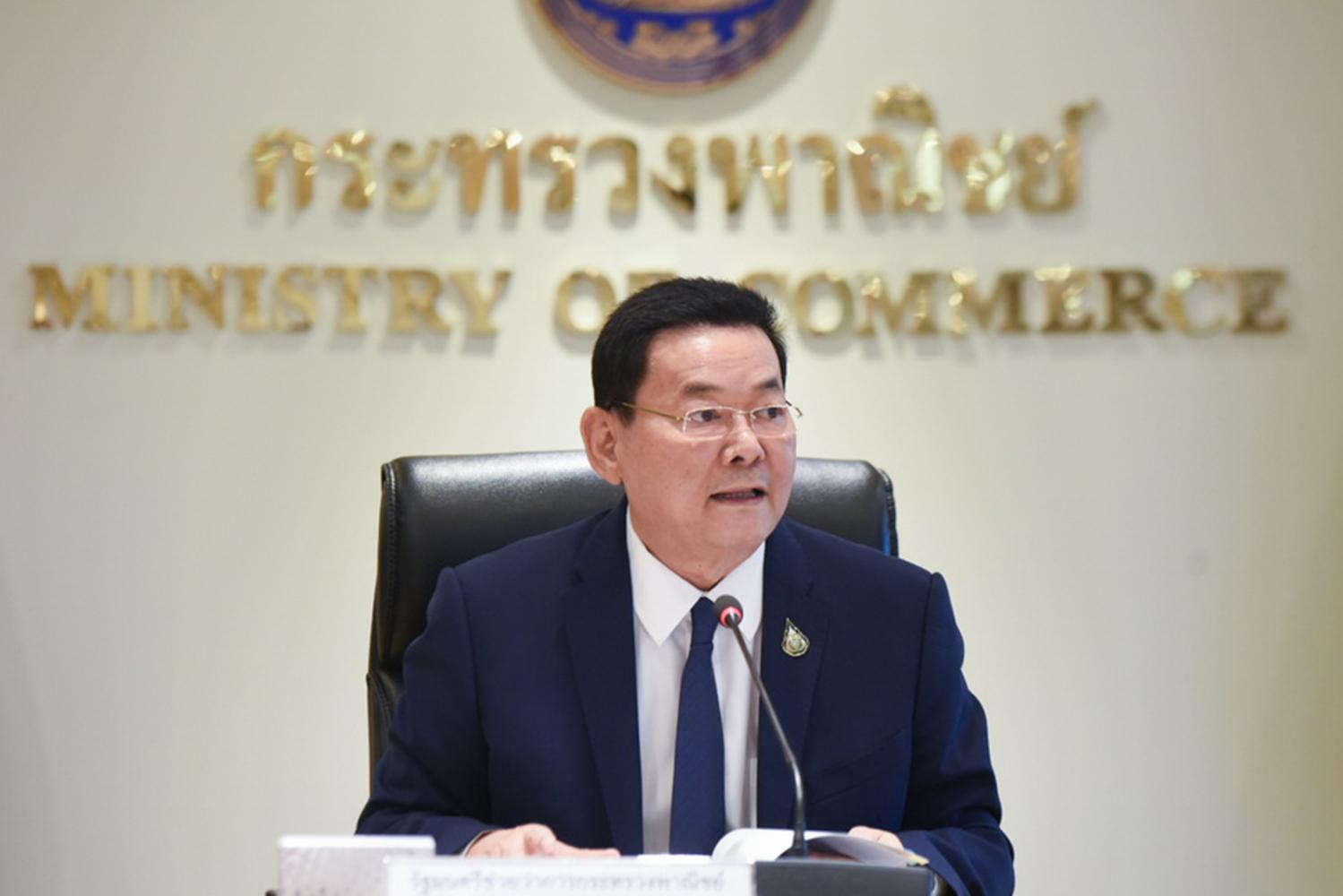Election Commission to Grill Three Bhumjaithai Figures in Senate Vote-Rigging Probe
A high-stakes development is unfolding as the Election Commission moves to question senior figures from the Bhumjaithai Party in connection with alleged vote rigging in last year’s Senate election. With multiple officials signaling their readiness to cooperate, the EC’s ongoing inquiry appears to be widening its focus beyond the initial targets, underscoring the sensitive nature of electoral integrity investigations in Thailand. The individuals named include a current deputy minister, a former parliamentary leader, and another party member who says he has long suspected EC scrutiny. As the scrutiny extends, the political landscape surrounding the Bhumjaithai Party and its role in the Senate race faces intensified public attention and legal scrutiny.
Background and Context of the EC Inquiry
The Election Commission of Thailand has announced, through a highly placed source, that at least three senior figures from the Bhumjaithai Party are slated to be summoned for questioning in connection with alleged irregularities tied to the vote in last year’s Senate election. This development follows a broader EC effort described as part of a broader probe into potential vote manipulation linked to the Senate results. The EC’s inquiry has already extended to a significant cohort of individuals connected to the Senate race, illustrating the commission’s ongoing commitment to examining procedural integrity and electoral fairness in one of the country’s key political processes.
The EC’s investigation into last year’s Senate election underscores the enduring sensitivity surrounding the vote and the mechanisms by which it is conducted in Thailand. The commission has emphasized the importance of ensuring that the electoral process remains transparent and free from manipulation, particularly in a contest as consequential as the Senate election. The ongoing questioning signals the EC’s intent to gather comprehensive testimony, collect documentary evidence, and assess whether any actors sought to influence the outcome through unlawful means.
Within this broader context, the EC’s approach appears to be methodical, prioritizing the orderly administration of legal procedures while advancing its inquiry. The nature of the allegations—whether they involve direct interference in the voting process, attempts to influence candidate lists, or other forms of collusion—remains a central concern for the commission and for observers monitoring the integrity of elections in the country. The EC’s actions so far, including the large number of summonses issued to date, reflect a sustained effort to uncover and address potential electoral malfeasance.
As the investigation progresses, commentators and political observers have been watching closely for signals about the scale and scope of the inquiry. The EC’s handling of summonses, the timing of notices, and the channels through which information is elicited—whether through written defenses or in-person appearances—are all elements that shape perceptions of impartiality and due process in this high-profile case. The unfolding process, while technical in nature, carries significant political implications for the involved parties and for the broader public discourse surrounding electoral reform and accountability.
Profiles of the Named Figures: Roles, Statements, and Context
Among the individuals reportedly on the EC’s radar are three senior Bhumjaithai Party figures, each bringing a distinct public role and political history to the inquiry. The first is Napintorn Srisanpang, who currently serves as Deputy Commerce Minister. He has asserted that he has not yet received an official summons from the EC but has learned of the move through media reports. Nevertheless, Napintorn has stressed his readiness to comply with any legal process and has reiterated his innocence. He has stated his willingness to provide information that could support his defense and has indicated no hesitation about complying with the EC’s procedures. While he has not commented on whether the case against him is politically motivated, he has expressed confidence in his ability to demonstrate his innocence once a formal summons, if any, is issued and served.
The second figure is Supachai Phosu, a veteran politician who has previously served as Member of Parliament for Nakhon Phanom and held the role of deputy speaker of the House of Representatives. Supachai is widely recognized for his long-standing legislative career, and his alleged involvement in the case adds another layer of significance to the EC’s inquiry. Supachai has likewise indicated that he has not received a formal letter from the EC as of the moment, but he has stated that he would vigorously refute the allegations against him should he be formally served with a summons. This position signals a readiness to confront the EC’s investigation directly and underscores the legal obligations that accompany any formal charges or summons.
A third figure, Wongsakorn Chanakit, is connected with the Bhumjaithai Party through the Phuket electoral contest in 2023, having stood on the BJT ticket in that district. Wongsakorn has stated that he has been aware for some time that he might be subject to EC scrutiny, suggesting that the party’s broader network could be under review. He clarified that, although he did not participate in last year’s Senate poll due to age constraints, he remains willing to cooperate with the EC as the investigation proceeds. His stance emphasizes cooperation and transparency, traits that are often expected from individuals involved in high-profile electoral inquiries.
In addition to these three figures, the move to bring more individuals into the EC’s questioning framework appears to be part of a larger pattern. A possible third figure’s inclusion hints at the involvement of other party members and associates who may have ties to the events under investigation. The EC’s evolving approach illustrates a broader effort to identify potential collusion or irregularities across the wider set of candidates and allied figures who may have influenced the Senate race.
The Legal Process and EC Procedures: What to Expect
The EC’s procedures in cases of suspected electoral irregularities are typically structured and formal. The process often begins with the issuance of official notices or summonses, indicating the date, time, and location for questioning or the submission of a written defense. In this current case, the EC has reportedly extended its inquiries beyond the initial group of 55 senators summoned earlier for questioning. The broader effort includes the possibility that losing candidates on the reserve list may also have engaged in collusion or other improper conduct. The source familiar with the matter indicates that these individuals may be required to speak with the EC, suggesting a rolling inquiry that could bring more players into the spotlight.
As part of the procedure, the EC has issued a directive to the 55 senators who were summoned in the initial wave, granting them a deadline to either submit a written defense or appear in person for questioning. The timing of these deadlines is critical, as it determines how the investigation proceeds and how quickly the commission can build a comprehensive record. The EC’s emphasis on both written defenses and in-person appearances reflects a balanced approach that accommodates different kinds of evidence and testimony while ensuring that the process remains fair and transparent.
In terms of interaction with the EC, Deputy Senate Speaker Kriangkrai Srirak, who was among the first group summoned, recently met with EC officials in person. While he did not disclose details of the meeting, his engagement with the commission reinforces the seriousness of the inquiry and the expectation that summoned individuals will cooperate fully. The engagement by a high-ranking Senate official underscores how intimately tied the EC’s actions are to the functioning of the Senate and the broader political ecosystem, where the integrity of electoral processes intersects with legislative governance.
The broader implications of the EC’s process are multifaceted. On one hand, the commission must maintain the premise of due process, ensuring that individuals have the opportunity to present their defenses, provide evidence, and respond to allegations. On the other hand, the public and political observers expect thorough accountability for actions that potentially undermined electoral integrity. The EC’s handling of the investigation will likely influence perceptions of impartiality and legitimacy in the electoral process, both in Thailand’s domestic political landscape and among international observers who monitor governance standards.
The Senate Election Context and Allegations: What Is at Stake
The allegations around vote manipulation in last year’s Senate election sit at the heart of a broader dialogue about electoral integrity in Thailand. The Senate’s composition, governance powers, and its oversight role in the political system render any credible accusation of vote rigging particularly consequential. The EC’s inquiry seeks to determine whether any actors engaged in activities that could distort the electoral outcome, including potential collusion among candidates and their supporters, or other means of influencing the vote through unlawful practices.
In the current development, the EC’s investigative reach is expanding beyond the original cohort of 55 senators who were summoned earlier. The possibility of additional examinations for those who were on reserve lists indicates a recognition that irregularities may have reached multiple layers of the electoral process, including both the primary slate of candidates and those who stood by for potential inclusion in the Senate’s lineup. This expansion underscores the commission’s concern with the integrity of the entire electoral cycle, from candidate vetting to final voting outcomes and post-election dynamics.
The involvement of Bhumjaithai Party members — a party with a significant role in regional politics and national affairs — adds a dimension of political sensitivity to the proceedings. The party’s leadership and broader network could be scrutinized for links to any irregularities, whether through formal channels or informal guidance that may have influenced campaign strategy or candidate selections. The EC’s ongoing inquiries thus intersect with questions about party discipline, campaign ethics, and the broader political culture surrounding electoral competition in the country.
At the same time, the timing and communication surrounding the summonses are essential for understanding the investigation’s trajectory. The 55 senators who were summoned were given a deadline to present written defenses or attend in person, indicating a structured approach designed to gather essential information efficiently. The EC’s method—balancing written submissions with live testimony—allows for a thorough examination of facts while mitigating undue delays in the inquiry. Observers will be watching to see how the EC applies these procedures as it potentially expands its reach to other figures and candidates involved in or connected to the Senate race.
Reactions, Statements, and Implications for the Bhumjaithai Party
The responses from the named figures highlight a commitment to cooperate with the EC and to defend themselves against the allegations. Napintorn Srisanpang has emphasized that he is prepared to comply with all legal procedures and maintain his innocence. His statement reflects a broader expectation among individuals under investigation to assert their rights and to present a robust defense to the commission’s inquiries. Napintorn’s assertion that he has not yet received an official summons underscores the procedural aspects of the EC’s process and the importance of formal notices to initiate any formal questioning or defense, even as media reports circulate and shape public perception.
Likewise, Supachai Phosu has indicated that he has not received a formal summons either but would refute the allegations should he be served. His stance mirrors that of Napintorn in emphasizing readiness to defend against the allegations and his willingness to engage fully with the EC’s process when proper legal procedures are invoked. Supachai’s background as a former MP and deputy speaker situates him as a long-standing figure in Thai politics, which may increase public interest in his case and add weight to the proceedings.
Wongsakorn Chanakit’s position adds another layer of complexity to the inquiry. Although he did not participate in last year’s Senate poll due to age constraints, he acknowledged his awareness of potential EC monitoring and expressed a willingness to cooperate with the investigation. His comments highlight the interconnected nature of party networks and electoral campaigns, where even those who were not directly involved in a particular election may be implicated in or affected by broader strategies and procedures.
Across the broader Bhumjaithai Party, the investigation’s development raises questions about political accountability, party discipline, and the potential impact on the party’s public image and electoral prospects. The party’s leadership faces the challenge of balancing cooperation with the EC, defending its members, and maintaining a cohesive political stance in a context where allegations of vote manipulation could influence voter trust and party support. The ongoing process may also influence strategic decisions within the party as it navigates internal management, public messaging, and long-term electoral strategy in a climate of heightened scrutiny.
In parallel, the EC’s actions have implications for the Senate’s functioning and for how the public perceives political accountability. The meeting by Deputy Senate Speaker Kriangkrai Srirak with the EC, without disclosing details of the discussion, signals a formal integration of legislative oversight and electoral regulation proceedings. The interaction between the EC and the Senate leadership underscores the essential need for transparency and accountability in a system where political actors operate within overlapping branches of government.
A broader takeaway from the current phase of the inquiry is the potential for further investigations into a wider set of actors associated with the Senate race. The EC’s ongoing work could prompt additional inquiries or the issuance of further summonses, particularly for losing candidates on reserve lists who may have been involved in related activities. The process’s pace and scope will determine how quickly clarity emerges regarding the extent of any irregularities and who, if anyone, may be held accountable.
The Broader Political Landscape: Implications for Thai Politics and Electoral Reform
The EC’s ongoing probe sits within a larger conversation about electoral integrity, governance, and political reform in Thailand. The investigation’s scope, its transparency, and its handling of high-profile figures carry implications for public trust in electoral institutions. As the EC pursues allegations of vote rigging and potential collusion in the Senate election, observers will be assessing whether the process strengthens the legitimacy of the electoral system or whether it raises concerns about politicization and selective accountability.
The Bhumjaithai Party, positioned as a regional powerhouse with influence in various policy areas, faces a critical moment. How the party responds to the EC’s inquiries—balancing cooperation, public statements, and strategic messaging—could shape its electoral fortunes in upcoming political cycles. The party’s ability to present a unified front while supporting individual members facing scrutiny will be a key dynamic to watch, influencing both internal cohesion and public perception.
Moreover, the EC’s actions have implications for political culture and the conduct of campaigns in Thailand. The investigation shines a light on the legal frameworks governing elections, the safeguards against manipulation, and the mechanisms by which investigations are conducted. The public’s expectations regarding transparency—especially when high-profile figures are involved—will influence how future electoral processes are designed and how authorities communicate about ongoing investigations.
The broader environment also includes the potential for reform discussions in Parliament regarding electoral rules, candidate lists, and the oversight mechanisms that ensure fairness. As lawmakers, including former and current members involved in the case, engage with the EC’s processes, debates about improving electoral integrity and reducing opportunities for manipulation may intensify. The outcome of this investigation could shape policy proposals, reform initiatives, and the political discourse surrounding elections in Thailand.
In this context, regional and international observers may monitor the EC’s conduct for adherence to due process, fairness, and impartiality. The international community often pays attention to how states manage electoral integrity matters, especially when allegations involve major political parties and the integrity of the legislative branch. The EC’s handling of the case can influence Thailand’s reputation in the arena of democratic governance and could impact how foreign partners and investors view the country’s political stability and rule-of-law framework.
Potential Outcomes, Next Steps, and What to Watch For
Looking ahead, several scenarios could unfold as the EC continues its inquiry and summons more individuals as needed. If the summoned figures submit written defenses or appear in person as required, the EC will evaluate the materials and testimony, with a view toward establishing whether there is sufficient evidence to proceed with further legal actions or administrative measures. Depending on the findings, potential outcomes could include clarifications of facts, disciplinary recommendations, administrative penalties, or other actions aligned with Thai electoral law and regulations. The precise consequences would depend on the strength of evidence, the nature of any proven irregularities, and the legal framework governing such cases.
The timeline for the EC’s ongoing process remains fluid, contingent on the receipt of written defenses, the scheduling of in-person hearings, and the expansion of the inquiry to additional individuals on the reserve list or those previously associated with the Senate race. The 55 senators already summoned have a near-term deadline to present their defenses or attend hearings, which will set the pace for subsequent steps in the investigation. The EC’s ability to manage multiple simultaneous proceedings will be essential to ensuring a coherent and timely resolution.
From a political perspective, the case presents several strategic considerations for the Bhumjaithai Party. The party may need to navigate reputational risks, maintain unity among its members, and communicate effectively with supporters and the general public about the investigation’s progress and its implications for governance and electoral integrity. The party’s strategic messaging may emphasize cooperation with authorities and a commitment to transparency, while addressing concerns about political motivation or bias in the investigation. How the party frames its response could influence public opinion and voter confidence.
Observers will also watch for any shifts in the EC’s approach as the investigation progresses. If more figures are summoned or if new evidence emerges linking other actors to alleged irregularities, the scope of the inquiry could broaden, prompting additional media coverage and political commentary. The interplay between legal proceedings and political dynamics will be a defining feature of the coming weeks and months, as stakeholders assess the potential implications for Thailand’s electoral landscape and for the governance of the Senate.
Public Accountability, Media Coverage, and The Way Forward
Public accountability remains a central objective of the EC’s actions in this case. By pursuing thorough examination and providing opportunities for defense, the EC aims to demonstrate that electoral processes are subject to rigorous scrutiny when concerns of irregularities arise. The presence of high-profile figures within the inquiry adds weight to the process, underscoring the importance of fairness, transparency, and due process in maintaining public trust.
Media coverage of the EC’s investigation has already shaped public understanding of the case, with reports highlighting the readiness of the implicated individuals to cooperate and the fact that several parties may be involved beyond the initial group. The media’s role in informing the public about procedural developments, deadlines, and responses from the individuals under scrutiny is an essential component of democratic oversight, contributing to an informed citizenry that can engage with the electoral process more confidently.
As the investigation continues, stakeholders will look for clear, consistent communications from the EC, the involved parties, and the Senate leadership. Timely updates, precise details about timelines, and transparent explanations of procedural steps will help ensure that the process remains understandable to the public and free from ambiguity. The next steps will likely involve continued hearings, the submission and review of written defenses, and ongoing assessments of whether further actions are warranted to safeguard the integrity of the electoral process.
Conclusion
The evolving inquiries by the Election Commission into alleged vote rigging in last year’s Senate election mark a pivotal moment for electoral accountability in Thailand. The EC’s decision to summon notable Bhumjaithai Party figures, alongside other participants in the Senate race, signals a broad and methodical effort to uncover the factual basis of the allegations and to establish whether any improper conduct occurred that could influence electoral outcomes. The statements from Napintorn Srisanpang, Supachai Phosu, and Wongsakorn Chanakit reflect a shared commitment to cooperation with EC processes and a readiness to defend themselves against the charges once formal proceedings commence. The possibility that additional individuals, including losing candidates on reserve lists, could be drawn into the inquiry points to a comprehensive investigation that may extend beyond the initial targets.
In the broader political context, the investigation tests Thailand’s electoral governance framework, the credibility of the EC, and the political resilience of the Bhumjaithai Party. The outcomes will influence public confidence in electoral integrity, the future conduct of campaigns, and the political calculations of the parties involved. As the EC advances its inquiries, the public can expect continued updates on procedural milestones, defense submissions, and any resulting actions or disciplinary measures should the evidence warrant them. The unfolding process will continue to shape the narrative around electoral reform, political accountability, and the integrity of Thailand’s legislative elections.



